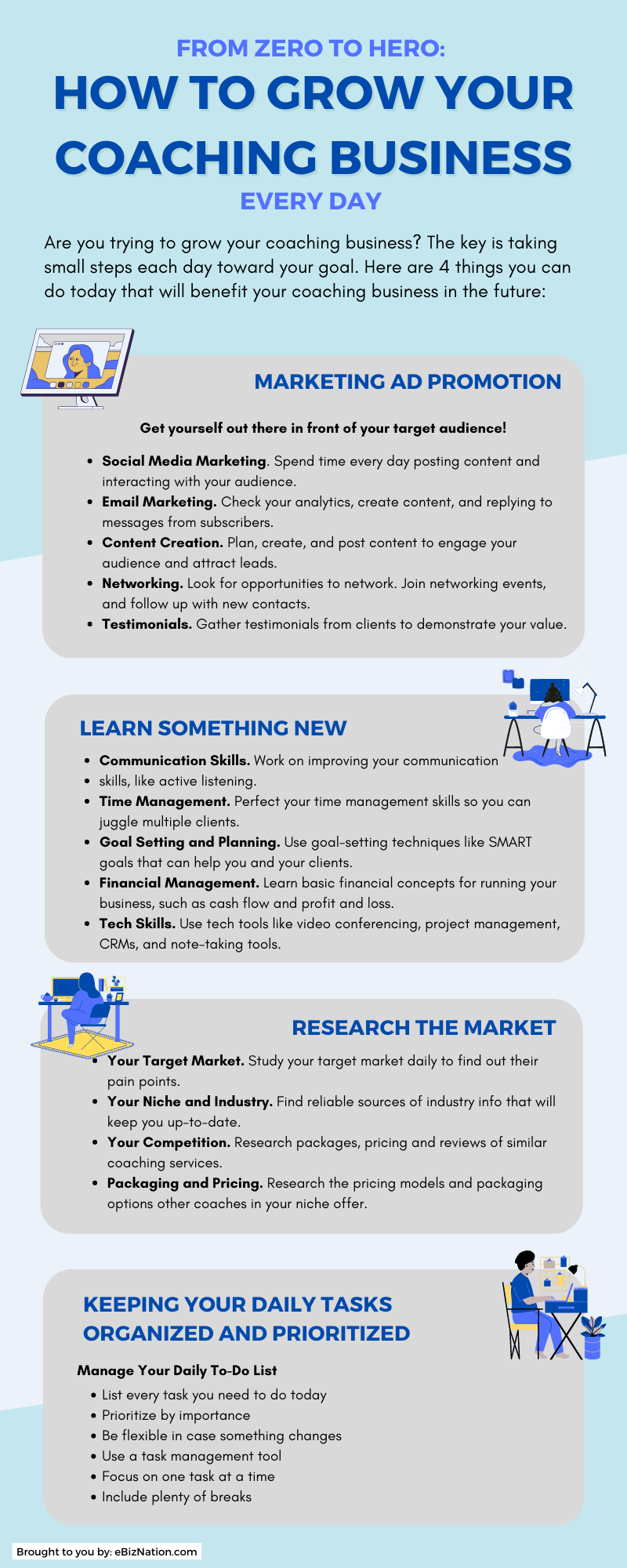4 Ways to Grow Your Coaching Business – Every Day

So you’ve found your calling as a coach and are keen to start impacting people’s lives, helping them achieve their goals. But to thrive in this field, you must begin growing your coaching business to reach a wider audience and ensure a steady flow of ideal clients.
In this post, we’ll focus on the tasks you can do every day in the critical areas of marketing and promotion, learning new skills, researching your market, and organization. We’ll guide you to take small steps that will build momentum and develop the essential skills that will set you up for long-term success. So let’s get started. Here are 4 ways to grow your coaching business today!
4 Ways to Grow Your Coaching Business

1. Marketing and Promotion
To grow your coaching business you must be visible to your target market to build relationships and engage them, so your marketing and promotion tasks are going to be a high-priority. Here are the key areas:
Social Media Marketing: Spend time every day on the platforms your target market uses. You should:
- Post content
- Employ tactics to grow your audience
- Interact with your fans and followers
- Run ads to promote your business
Email Marketing. Email marketing tasks include checking analytics, creating content, and replying to messages from subscribers. You might also spend some time on strategy.
Content Creation. Your business needs a constant flow of new content that helps your clients with their problems. Content is essential for SEO, engaging your audience, and lead generation. You should create and publish blog posts, videos, podcasts, social media content, and resources you can give your clients.
Networking. You can greatly benefit from meeting other coaches and people in your industry. Get into a pattern of looking for opportunities to network, join events, and follow up with new contacts. Any relationship might result in bringing business or referrals.
Testimonials. Gather testimonials from past and current clients to use in your marketing. Ask them to comment on how your coaching has helped them. Post these on your website and social media profiles.
2. Learn Something New
To be an impactful coach, you need a wide array of talents. There’s no better time than right now to start learning skills that can help you later.
Communication Skills. Improve on your communication skills to build rapport with clients, set expectations, and help them achieve their goals.
One of the most essential skills for a coach is active listening. This is a technique where you are fully engaged in listening to the client and can repeat back what they have said in your own words to reinforce and clarify. This will help you to understand and empathize with your clients’ feelings.
Time Management. As a busy coach, you’ll be juggling multiple clients. You’ll have prep work, follow-ups, and other tasks between sessions. Therefore, it’s crucial to manage your time well. This is something you should learn now before your schedule fills up.
A good time management technique you can use is time blocking. This means setting aside a specific block of time for each activity or task. It allows you to control your day and the amount of time you spend on each. For example, time blocks might include:
- Sessions
- Administrative tasks
- Prep time
- Marketing activities
- Self-care activities
- Personal development tasks
Goal Setting and Planning. Effective goal setting is important for growing your coaching business and helping clients. Set your own personal and professional SMART goals – Specific, Measurable, Achievable, Relevant, and Time-bound – and break them into sub-goals and tasks. Then, monitor progress each day.
Financial Management. Most coaches work for themselves, which means managing their own finances. As your business grows, you’ll need to stay on top of your finances and understand basic financial concepts like profit & loss and cash flow.
Tech Skills. Coaches increasingly use tech tools in their businesses, like video conferencing, project management tools, CRMs, note-taking tools, etc. One task you can add to your daily to-do list is to try out new tech tools. When it comes time to use them with a client, you’ll have a variety to offer that you’re already an expert at using.
3. Research the Market
Each day you’ll want to spend some time learning about the market and your place in it. The insights you gain through research can help you find ways to grow your coaching business, methods for engaging your target audience, and areas you can improve.
Your Target Market. Research your target market. Find out problems, pain points, topics they like to discuss, and questions they ask. Use this feedback to improve your marketing, content, and services.
Your Niche and Industry. You can never know too much about your niche and industry. Read trade journals and popular blogs to see what trends are happening now. Find reliable sources of industry info you can subscribe to and read regularly.
Competitive Analysis. Research your competitors or others offering similar coaching services and see their packages and pricing. Look at reviews and social media comments to see what past clients say about them. Identify their niche and how they specialize or separate themselves from others. Check out their content and the topics they cover.
Packaging and Pricing. Research the pricing models and packaging options other coaches in your niche offer. You can use this information to create your own coaching packages.
4. Keeping Your Daily Tasks Organized and Prioritized
As a coach, managing tasks is essential for growing your coaching business. One way to stay organized and focused is to create a to-do list and prioritize. This helps you manage multiple tasks throughout the day and ensure everything gets done.
We each have our way of organizing to-do lists, but here are some tips that will help.
Start with a Brain Dump. The best way to get started is to dump everything into a list. Don’t try to prioritize yet. Just get everything down and include small tasks you’ll finish within the day and large projects you need to progress on.
Set Priorities. Prioritize your tasks in order of importance. There are several ways you can do this. One is to imagine you can only complete one item today. What would that one item be? Put that at the top and then ask yourself again about the remaining tasks.
Be Flexible. Your priorities might change, so be flexible. You might move small tasks that can be completed quickly further up the list to get them done. For example, you might have an email to write that will take a few minutes. Or, you might have shifting deadlines or an emergency that necessitates immediate attention.
Use a Task Management Tool. Many coaches use software programs like Trello, Asana, or Todoist to manage their to-do lists. They offer additional features like time management, progress tracking, and collaboration tools.
Focus on One Task at a Time. Multitasking seems like an efficient way to get things done, but it robs you of your focus. Instead, do one thing at a time and manage time effectively so you can get to each task.
Schedule Breaks. Ensure your to-do list includes breaks to allow you to refocus and recharge. You don’t want to get burned-out and lose your concentration
Conclusion
It may take time to “grow your coaching business”. Make sure you spend each day building your systems, marketing your business, and learning new skills. All of this will pay off later when your schedule is full of client sessions.



